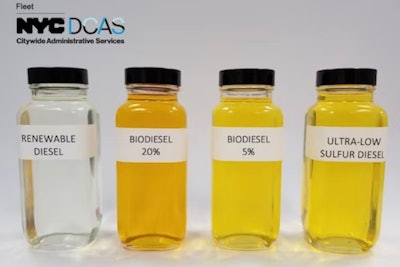Penske Truck Leasing is excited about renewable diesel and it’s easy to see why.
The Pennsylvania-based global trucking giant is seeing impressive performance gains, lower maintenance costs and reduced emissions in California where all 32 of their locations are now fueling up Penske trucks with renewable diesel following a recent supplier agreement with Shell.
Switching to the biofuel, which is produced from plant and animal matter, has led to less maintenance expense, according to Penske’s vice president of energy and fuel supply Josh Tippin, thanks largely to the fuel’s cleaner burn.
While Tippin can’t nail down an exact cost savings since Penske’s trucks fuel over the road outside of California where renewable diesel is mostly unavailable, he did say that “we agree with the majority of the studies that are showing around a two cent per mile maintenance when compared to traditional diesel.”
Tippin said the fuel’s cleaner burn has reduced diesel particulate filter maintenance and is “causing a reduction in that maintenance cost.”
[Related: Fuel groups argue that Biden decarbonization blueprint undoes trucking’s emissions reduction efforts]
Higher cetane values, which the Department of Energy reports at being 70 or higher versus 45 to 55 in traditional diesel, also deliver greater power.
“Absolutely,” Tippin said. “Renewable diesel’s anywhere from 10, 20, to 30 cetane number higher than traditional diesel, depending on where you’re getting it from, and that automatically is going to improve your ignition, your power off the start. Anytime you have that big, big boost — and those are pretty large percentage gains — you’re going to have a much better power output.”
 The New York City Department of Sanitation has also reported benefitting from using renewable diesel. Renewable diesel is not biodiesel. Though made from the same plant and animal waste matter, renewable diesel undergoes a hydrotreating refinery process like conventional fuels which renders a cleaner-burning product with cetane values at 70 or higher according to the Department of Energy.NYC Department of Citywide Administrative Services
The New York City Department of Sanitation has also reported benefitting from using renewable diesel. Renewable diesel is not biodiesel. Though made from the same plant and animal waste matter, renewable diesel undergoes a hydrotreating refinery process like conventional fuels which renders a cleaner-burning product with cetane values at 70 or higher according to the Department of Energy.NYC Department of Citywide Administrative Services
Penske is still testing renewable diesel with OEMs to get a clearer picture of fuel economy impact, but so far they like what they see.
“With traditional diesel you will see degradation over time because of the buildup of coking in the engine,” Tippin said. “With this being a cleaner product in the engine, you’re not seeing that same rate of degradation that you would see with traditional diesel. So improved is probably not the right, but it’s better than [conventional diesel].”
Emissions have dropped as well.
“We have our own ESG group in-house and we have our own environmental group in-house and it’s a constant discussion that we have around what claims can be made and stated,” Tippin explained. “I will say that the claims that are out there today, depending on the feedstock, show a GHG well-to-wheel reduction from 60 to 85%. And that’s well-to-wheel accounting, which has its own set of accounting methodology for the GHG reduction, but I think we would agree with all those numbers.”
While renewable diesel is mostly confined to California where the fuel is subsidized and often priced below traditional diesel, Tippin is encouraged by a growing number of renewable fuel producers including Shell, which is building a renewable diesel plant in Convent, Louisiana according to The Houston Chronicle.
Renewable diesel and biodiesel climbed to a 21% share of all diesel fuel sold in California in 2020, according to a recent report from the California Air Resources Board. Both fuels accounted for 44% of the state’s Low Carbon Fuel Standard (LCFS) credits in 2020.
Credits acquired by renewable fuel producers and fleets using those fuels are sold to other entities required by the state to offset their emissions. It’s big business with more than 25 million LCFS credits transacted in 2021 – a value of $4.7 billion, according to Pacific Gas & Electric.
Heavy-duty trucking is one of the most difficult segments to decarbonize, leading lawmakers to require and incentivize the production and use of renewable diesel and biodiesel. For instance, the Inflation Reduction Act supports additional production of biofuels including renewable diesel.
“As supply increases we expect the cost to react in a positive way,” Tippin said. “I don’t know when we get to the parity piece but I know with all of these refineries coming out in 2023 that the amount of production is set to double even triple the amount of renewable diesel which will have an impact on a lot of different factors in the economics of the product.”
In the meantime, Tippin said other fleets shouldn’t hesitate to try the fuel when possible.
“Penske is the fleet of fleets and we’re a huge proponent of renewable diesel,” he said. “We’re our own maintenance company and our maintenance people are fond of this product. So that in itself is the stamp of approval for anybody looking to get into it. If the fleet of fleets is all about it, then I don’t see a reason why you shouldn’t be as well.”
